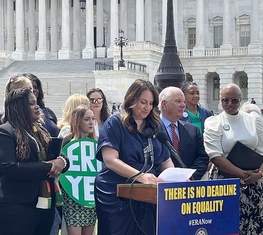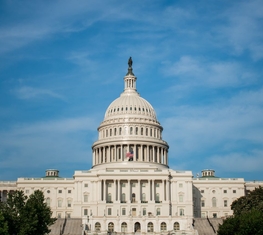Meta Platforms, Inc. v. State of Washington
Case Summary
LWV Washington, Campaign Legal Center, the Brennan Center for Justice, and Fix Democracy First filed an amicus brief in the Washington Court of Appeals defending the state’s disclosure requirements for online political advertising. LWV Washington and its co-amici urged the court to affirm a Superior Court judgment penalizing Meta for failing to obey the requirements.
Washington’s Fair Campaign Practices Act (“FCPA”) requires that commercial entities that run election-related advertisements publicly disclose information on their purchase and content (collectively, “disclosure requirements”).
Among the information that must be disclosed are the name of the candidate or ballot measure the advertisement supports or opposes, a copy of the advertisement, the name and address of the sponsoring person or persons actually paying for the advertising or electioneering communication, including the federal employer identification number, or other verifiable identification of an entity, so the public can know who paid for the advertising or communication, without having to locate and identify any affiliated entities and, the cost of the advertisement, and the dates it was shown to the public.
The FCPA also requires digital platforms like Meta (formerly known as Facebook), to disclose additional information about the campaign advertisements they run, including the demographic information and statistical characteristics of a population (e.g., age, gender, race, location, etc.), of the target audiences to the extent such information is collected by the commercial advertiser in the regular course of business, and the total number of impressions generated.
On October 6, 2022, the King County Superior Court found that Meta had violated the FCPA’s disclosure requirements by failing to comply with requests for information by several Washington residents. The court granted the Washington State Attorney General’s motion for summary judgment, and imposed punitive damages on Meta, finding the company had knowingly violated the FCPA’s disclosure requirements and acted in bad faith.
Meta subsequently appealed to the Washington State Court of Appeals, arguing the disclosure requirements for digital platforms were unconstitutional under the First Amendment and preempted by Section 230 of the federal Communications Decency Act. On appeal, Meta argued the disclosure requirements were nearly impossible to comply with, and violated the First Amendment by requiring the company to stop running campaign ads in Washington to avoid being penalized, reducing the amount of speech.
On August 10, 2023, the League of Women Voters of Washington (“LWV Washington”), the Brennan Center for Justice, Fix Democracy First, and Campaign Legal Center, filed an amicus brief in the Washington Court of Appeals, defending the disclosure requirements and asking the court to affirm the trial court’s ruling. The brief argued the disclosure requirements complied with the First Amendment, and served several important interests, like helping the public understand the funding of advertisements, assisting journalists and citizens in obtaining information on campaigns, and fighting disinformation in the digital space.
LWV Washington was represented by Campaign Legal Center and MacDonald, Hoague, and Bayless in this matter.
LWV Timeline
State trial court penalizes Meta for violating disclosure requirements
A state court grants the Washington attorney general’s motion for summary judgment and imposes punitive damages, finding Meta intentionally violated the FCPA’s disclosure requirements for digital campaign advertisements.
Meta files appeal
Meta appeals the trial court’s decision to the Washington Court of Appeals, arguing the disclosure requirements are unconstitutional under the First Amendment and preempted by federal law.
LWV Washington files amicus brief
LWV Washington and co-amici file an amicus brief in the court of appeals, supporting the disclosure requirements’ constitutionality and pointing to the important public interests promoted.




